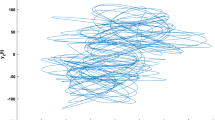Abstract
This paper presents a novel intelligent digital redesign (IDR) technique for a sampled-data fuzzy controller of fuzzy systems which can be modeled in Takagi-Sugeno (T-S) fuzzy systems. The IDR technique, which is one of sampled-data fuzzy controller design techniques, is to effectively convert a well-designed analog fuzzy controller into a sampled-data fuzzy controller in the state-matching sense. In this paper, unlike previous IDR techniques, the state-matching error is minimized by defining the state-matching error cost function. Also, to improve the state-matching condition, the exact discretized model is used for the proposed IDR technique. The sufficient condition of the proposed IDR technique is developed and derived in terms of linear matrix inequalities (LMIs). Finally, some numerical examples are provided to verify the effectiveness of the proposed techniques.
Similar content being viewed by others
References
D. Nešić and A. R. Teel, “Sampled-data control of nonlinear systems: an overview of recent results,” Perspectives in Robust Control, vol. 268, pp. 221–239, 2001. [click]
L. S. Hu, T. Bai, P. Shi, and Z. Wu, “Sampled-data control of networked linear control systems,” Automatica, vol. 43, pp 903–911, 2007. [click]
H. K. Lam and L. D. Seneviratne, “Tracking control of sampled-data fuzzy-model-based control systems,” IET Control Theory Appl., vol. 13, no. 1, pp. 56–67, 2009.
B. C. Kuo, Digital Control Systems, Holt, Rinehart and Winston, New York, 1980.
T. Chen and B. Francis, Optimal Sampled-data Control Systems, Springer, London, 1995.
P. Dorato, C. Abdallah, and V. Cerone, Linear-Quadaratic Control: An Introduction, Prentice-Hall, New Jersey, 1995.
L. S. Shieh, W. M. Wang, and J. S. H. Tsai, “Digital modelling and digital redesign of sampled-data uncertain systems”, IEE Proc. Control Theory Appl., vol. 142, no. 6, pp. 585–594, 1995. [click]
L. S. Shieh, W. M. Wang, and J. B. Zheng, “Robust control of sampled-data uncertain systems using digitally redesigned observer-based controllers,” Int. J. Control, vol. 66, pp. 43–64, 1997. [click]
C. A. Rabbath, N. Hori, and N. Lechevin, “Convergence of sampled-data models in digital redesign,” IEEE Trans. Autom. Control, vol. 49, no. 5, pp. 850–855, 2004. [click]
S. M. Guo, L. S. Shieh, G. Chen, and C. F. Lin, “Effective chaotic orbit tracker: a prediction-based digital redesign approach,” IEEE Trans. Circ. Syst. I, vol. 47, no. 11, pp. 1557–1570, 2000. [click]
J. S. H. Tsai, L. S. Shieh, and J. L. Zhang, “An improvement on the digital redesign method based on the blockpulse function approximation,” Circuits Syst. Signal Process., vol. 12, no. 1, pp. 37–49, 1993.
Y. N. Rosenwasser, K. Y. Polyakov, and B. P. Lampe, “Application of Laplace transformation for digital redesign of continuous control systems,” IEEE Trans. Autom. Control, vol. 44, no. 4, pp. 883–886, 1999. [click]
E. N. Rosenwasser and B.P. Lampe, Computer Controlled Systems -Analysis and Design with Process-Orientated Models, Springer, London, 2000.
S. M. Guo and Z. H. Peng, “An observer-based decentralized tracker for sampled-data systems: An evolutionary programming approach,” Int. J. General Syst., vol. 34, no. 4, pp. 421–449, 2005. [click]
C. C. Hsu and G. Y. Lin, “Digital redesign of uncertain interval systems based on time-response resemblance via particle swarm optimization,” ISA Trans., vol. 48, pp. 264–272, 2009.
C. C. Hsu, W. Y. Shieh, and C. H. Gao, “Digital redesign of uncertain interval systems based on extremal gain/phase margins via a hybrid particle swarm optimizer,” Appl. Soft Comput., vol. 10, no. 2, pp. 602–612, 2010. [click]
H. J. Lee, L. S. Shieh, and D. W. Kim, “Digital control of nonlinear systems: Optimal linearisation-based digital redesign approach,” IET Control Theory Appl., vol. 2, no. 4, pp. 337–351, 2008. [click]
D. W. Kim and H. J. Lee, “Controlling linear systems with nonlinear perturbations under sampled-data output feedback: Digital redesign approach,” Int. J. Control, vol. 83, no. 8, pp. 1718–1726, 2010. [click]
D. H. Lee, Y. H. Joo, and S. K. Kim, “H ∞ digital redesign for LTI systems,” Int. J. Control, Autom. Syst., vol. 13, no. 3, pp. 603–610, 2015. [click]
Y. H. Joo, G. Chen, and L. S. Shieh, “Hybrid state-space fuzzy model-based controller with dual-rate sampling for digital control of chaotic sysems,” IEEE Trans. Fuzzy Syst., vol. 7, no. 4, pp. 394–408, 1999. [click]
H. J. Lee, H. B. Kim, Y. H. Joo, W. Chang, and J. B. Park, “A new intelligent digital redesign for T-S fuzzy systems: global approach,” IEEE Trans. Fuzzy Syst., vol. 12, no. 2, pp. 274–284, 2004. [click]
H. C. Sung, D. W. Kim, J. B. Park, and Y.H. Joo, “Robust digital control of fuzzy systems with parametric uncertainties: LMI-based digital redesign approach,” Fuzzy Sets Syst., vol. 161, pp. 919–933, 2010. [click]
G. B. Koo, J. B. Park, and Y. H. Joo, “Intelligent digital redesign for nonlinear systems using a guaranteed cost control method,” Int. J. Control, Autom. Syst., vol. 11, no. 6, pp. 1075–1083, 2013. [click]
J. H. Moon and H. J. Lee, “Performance recovery of intelligent digital redesign for observer-based output feedback under immeasurable premise variables,” IET Control Theory Appl., vol. 9, no. 12, pp. 1846–1856, 2015. [click]
G. B. Koo, J. B. Park, and Y. H. Joo, “Intelligent digital redesign for non-linear systems: observer-based sampleddata fuzzy control approach,” IET Control Theory Appl., vol. 10, no. 1, pp. 1–9, 2016.
G. B. Koo, J. B. Park, and Y. H. Joo, “Intelligent digital redesign of fuzzy controller for non-linear systems with packet losses,” IET Control Theory Appl., vol. 10, no. 3, pp. 292–299, 2016. [click]
H. J. Lee and D.W. Kim, “Performance-recoverable intelligent digital redesign for fuzzy tracking controllers,” Infom. Sci., vol. 10, no. 3, pp. 292–299, 2016.
S. C. Jee, H. J. Lee, and D. W. Kim, “Detecting sensor fault for nonlinear systems in T-S form under sampled-data measurement: Exact direct discrete-time design approach,” Int. J. Control, Autom. Syst., vol. 14, no. 2, pp. 435–442, 2016.
H. J. Kim, J. B. Park, and Y. H. Joo, “Fuzzy filter for nonlinear sampled-data systems: intelligent digital redesign approach,” Int. J. Control, Autom. Syst., vol. 15, no. 2, pp. 603–610, 2017. [click]
H. J. Kim, J. B. Park, and Y. H. Joo, “An improved H ∞ fuzzyy filter for nonlinear sampled-data systems,” Int. J. Control, Autom. Syst., vol. 15, no. 3, pp. 1394–1404, 2017. [click]
D. W. Kim, H. J. Lee, and M. Tomizuka, “Fuzzy stabilization of nonlinear systems under sampled-data feedback: an exact discrete-time model approach,” IEEE Trans. Fuzzy Syst., vol. 18, no. 2, pp. 251–260, 2010. [click]
D. W. Kim and H. J. Lee, “Sampled-data observer-based output-feedback fuzzy stabilization of nonlinear systems: exact discrete-time design approach,” Fuzzy Sets Syst., vol. 201, pp. 20–39, 2012. [click]
K. Gu, “An integral inequality in the stability problem of time-delay systems,” Proc. of the 39th IEEE Conf. Decision and Control, pp. 2805–2810, 2000.
G. B. Koo, J. B. Park, and Y. H. Joo, “Exponential meansquare stabilisation for non-linear systems: sampled-data fuzzy control approach,” IET control Theory Appl., vol. 6, no. 18, pp. 2765–2774, 2012. [click]
A. Sala and C. Ari ˜ no, “Asymptotically necessary and sufficient conditions for stability and performance in fuzzy control: applications of Polya’s theorem,” Fuzzy Sets Syst., vol. 158, pp. 2671–2686, 2007. [click]
M. Narimani and H. K. Lam, “Relaxed LMI-based stability conditions for Takagi-Sugeno fuzzy control systems using regional-membership-function-shape-dependent analysis approach,” IEEE Trans. Fuzzy Syst., vol. 17, no. 5, pp. 1221–1228, 2009. [click]
J. Dong and G. H. Yang, “Control synthesis of T-S fuzzy systems based on a new control scheme,” IEEE Trans. Fuzzy Syst., vol. 19, no. 2, pp. 323–338, 2011. [click]
J. Qiu, H. Tian, Q. Lu, and H. Gao, “Nonsynchronized robust filtering design for continuous-time T-S fuzzy affine dynamic systems based on piecewise Lyapunov functions,” IEEE Trans. Cybern., vol. 43, no. 6, pp. 1755–1766, 2013. [click]
J. Qiu, Y. Wei, and L. Wu, “A novel approach to reliable control of piecewise affine systems with actuator faults,” IEEE Trans. Circuits Syst. II, Exp. Briefs, to be published, DOI: 10.1109/TCSII.2016.2629663.
J. Qiu, H. Gao, and S. X. Ding, “Recent advances on fuzzymodel-based nonlinear networked control systems: a survey,” IEEE Trans. Ind. Electron., vol. 63, no. 2, pp. 1207–1217, 2016. [click]
E. Kim and H. Lee, “New approaches to relaxed quadratic stability conditions of fuzzy control systems,” IEEE Trans. Fuzzy Syst., vol. 8, no. 5, pp. 523–534, 2000. [click]
S. G. Cao, N. W. Rees, and G. Feng, “Stability anaylsis and design for a class of continuous-time fuzzy control systems,” Int. J. Control, vol. 64, no. 6, pp. 1069–1087, 1996. [click]
L. Xiaodong and Z. Qingling, “New approaches to H ∞ controller designs based on fuzzy observers for T-S fuzzy systems via LMI,” Automatica, vol. 39, no. 9, pp. 1571–1582, 2003. [click]
Author information
Authors and Affiliations
Corresponding author
Additional information
Recommended by Associate Editor Sun Jin Yoo under the direction of Editor Duk-Sun Shim. This work was supported by the National Research Foundation of Korea(NRF) grant funded by the Korea government(MSIP; Ministry of Science, ICT & Future Planning) (No. NRF-2017R1C1B1005422).
Geun Bum Koo received the B.S. and Ph.D. degrees in Electrical and Electronic Engineering from Yonsei University, Seoul, Korea, in 2007 and 2015, respectively. He is currently a professor in the Division of Electrical, Electronic and Control Engineering, Korea. His current research interests include large-scale systems, decentralized control, sampled-data control, digital redesign, nonlinear control, and fuzzy systems.
Jin Bae Park received the B.S. degree in electrical engineering from Yonsei University, Seoul, Korea, and the M.S. and Ph.D. degrees in electrical engineering from Kansas State University, Manhattan, KS, USA, in 1977, 1985, and 1990, respectively. Since 1992, he has been with the Department of Electrical and Electronic Engineering, Yonsei University, where he is currently a Professor. His major research interests include robust control and filtering, nonlinear control, intelligent mobile robot, drone, fuzzy logic control, neural networks, adaptive dynamic programming, chaos theory, and genetic algorithms. Dr. Park served as the Editor-in-Chief for the International Journal of Control, Automation, and Systems (2006-2010), the President for the Institute of Control, Robot, and Systems Engineers (2013), and the Senior Vice-President for Yonsei University (2015-2016).
Young Hoon Joo received the B.S., M.S., and Ph.D. degrees in electrical engineering fromYonsei University, Seoul, Korea, in 1982, 1984, and 1995, respectively. He worked with Samsung Electronics Company, Seoul, Korea, from 1986 to 1995, as a Project Manager. He was with the University of Houston, Houston, TX, USA, from 1998 to 1999, as a Visiting Professor with the Department of Electrical and Computer Engineering. He is currently a Professor with the Department of Control and Robotics Engineering, Kunsan National University, Kunsan, Korea. His major research interests include the field of intelligent robot, robot vision, intelligent control, human robot interaction, wind-farm control, and intelligent surveillance systems. Dr. Joo served as the President for the Korea Institute of Intelligent Systems (2008-2009), Vice-President for the Korean Institute of Electrical Engineers (2013-2014), and the Editor-in-Chief for the International Journal of Control, Automation, and Systems (2014-2017).
Rights and permissions
About this article
Cite this article
Koo, G.B., Park, J.B. & Joo, Y.H. Intelligent Digital Redesign for Sampled-data Fuzzy Control Systems Based on State-matching Error Cost Function Approach. Int. J. Control Autom. Syst. 16, 350–359 (2018). https://doi.org/10.1007/s12555-017-0166-3
Received:
Revised:
Accepted:
Published:
Issue Date:
DOI: https://doi.org/10.1007/s12555-017-0166-3




